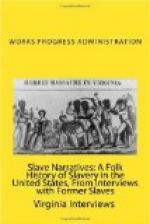“Ever’ mornin’ ‘bout fo’ ’clock us could hear dat horn blow for us to git up an’ go to de fiel’. Us always quit work ’fore de sun went down an’ never worked at night. De overseer was a white man. His name was Josh Neighbors, but de driver was a cullud man, ‘Old Man Henry.’ He wasn’t ’lowed to mistreat noboby. If he got too uppity dey’d call his han’, right now. De rule was, if a Nigger wouldn’ work he mus’ be sol’. ’Nother rule on dat place was dat if a man got dissati’fied, he was to go to de marster an’ ask him to put ‘im in his pocket.’ Dat meant he wanted to be sol’ an’ de money he brought put in de marster’s pocket. I aint never known o’ but two askin’ to be ‘put in de pocket.’ Both of ‘em was sol’.
“Dey had jails in dem days, but dey was built for white folks. No cullud person was ever put in one of ’em ’til after de war. Us didn’ know nothin’ ’bout dem things.
“Course, Old Mis’ knowed ’bout ’em, ’cause she knowed ever’thing. I recollec’ she tol’ me one day dat she had learnin’ in five diffe’ent languages.
“None o’ us didn’ have no learnin’ atall. Dat is us didn’ have no book learnin’. Twant no teachers or anything lak dat, but us sho’ was taught to be Christians. Ever’thing on dat place was a blue stockin’ Presbyterian. When Sund’y come us dressed all clean an’ nice an’ went to church. Us went to de white folks’ church an’ set in de gal’ry.
“Us had a fine preacher. His name was Gober. He could sho’ give out de words o’ wisdom. Us didn’ have big baptisins lak was had on a heap o’ places, ‘cause Presbyterians don’t go down under de water lak de Baptis’ do. If one o’ de slaves died he was sho’ give a gran’ Christian fun’al. All o’ us mourners was on han’. Services was conducted by de white preacher.
“Old Mis’ wouldn’ stan’ for no such things as voodoo an’ ha’nts. When she ’spected[FN: inspected] us once a week, you better not have no charm ‘roun’ yo’ neck, neither. She wouldn’ even ’low[FN: allow] us wear a bag o’ asfittidy[FN: asafetida]. Mos’ folks b’lieved dat would keep off sickness. She called such as dat superstition. She say us was ’lightened Christian Presbyterians, an’ as such us mus’ conduc’ ourse’fs.
“Nobody worked after dinner on Satu’d’y. Us took dat time to scrub up an’ clean de houses so as to be ready for ‘spection Sund’y mornin’. Some Satu’d’y nights us had dances. De same old fiddler played for us dat played for de white folks. An’ he sho’ could play. When he got dat old fiddle out you couldn’ keep yo’ foots still.
“Christ’mus was de time o’ all times on dat old plantation. Dey don’t have no such as dat now. Ever’ chil’ brought a stockin’ up to de Big House to be filled. Dey all wanted one o’ de mistis’ stockin’s, ’cause now she weighed nigh on to three hund’ed pounds. Candy an’ presents was put in piles for ever’ one. When dey names was called dey walked up an’ got it. Us didn’ work on New Year’s Day. Us could go to town or anywhere us wanted to.




